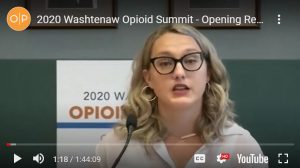 As with many other conferences and events around the county, the 3rd annual Washtenaw Opioid Summit looked quite a bit different this year. Recognizing that COVID-19 has challenged all aspects of substance use disorder (SUD) and recovery, WHI Opioid Project members felt it was more important than ever to make sure we continued with the annual summit. Utilizing an online format, this year’s summit was attended by almost 170 participants from over 65 different organizations.
As with many other conferences and events around the county, the 3rd annual Washtenaw Opioid Summit looked quite a bit different this year. Recognizing that COVID-19 has challenged all aspects of substance use disorder (SUD) and recovery, WHI Opioid Project members felt it was more important than ever to make sure we continued with the annual summit. Utilizing an online format, this year’s summit was attended by almost 170 participants from over 65 different organizations.
Sara Szczotka and Juan Marquez, WHI Opioid Project co-chairs, opened the event by highlighting the ways COVID-19 has challenged our local SUD support landscape and Opioid Project goals for community education, community partnerships, and race equity.
State Senator Jeff Irwin (MI-18) talked about the need to address this epidemic as a community with more naloxone, better medical responses, and attention to “the intersections between poverty, between lack of housing, between trauma in the home, and how those play into…the vortex of addiction”.
The morning keynote by Adreanne Waller, Washtenaw County Health Department epidemiologist, focused on health equity. Waller highlighted the documented health inequities across Washtenaw County and racial disparities in overdose rates among communities of color. Waller also showed similar inequities in housing, employment and earning potential, the criminal justice system, and other quality of life measures.
The afternoon keynote presentation was delivered by Dr. Onawa LaBelle, a researcher at the University of Windsor in Ontario, Canada. LaBelle and her team studied the effects of SUD support groups transitioning to virtual settings and highlighted a number of positive outcomes such as participating in meetings outside the local community. However, her study also found negative consequences, such as a “lack of physical social engagement” that made meetings less impactful for participants.
Like last year, the summit was able to provide a series of five smaller breakout sessions which have been recorded and added to the WHI Opioid Project website:
Overcoming Barriers to Internalized Stigma, facilitated by Erin Spanier, communications manager at the Center for Health and Research Transformation (CHRT).
- Youth Outreach and Prevention, facilitated by Chardae Korhonen, engagement program manager at Ozone House.
- Coordinating Policy to Produce Better Outcomes, facilitated by Holly Standhardt, senior quality consultant at MPRO.
- Roadmap to Criminal Justice Diversion, facilitated by Katie Abraham, support coordinator for Avalon Housing
- Harm Reduction: Evidence vs. Policy, facilitated by Ashley Shukait, harm reduction program manager at UNIFIED HIV Health and beyond.
Overall, hosting the summit in a virtual environment allowed the group to better utilize technology to help fight the opioid epidemic. By visiting the WHI Opioid Project’s “Video Library” anyone is able to access the summit recordings along with short educational seminars that the Opioid Project will be offering in the near future.
To learn more about the summit, or participate in planning future summits, please contact, Matt Hill, Washtenaw Health Initiative substance use disorder program manager, at hillmat@med.umich.edu or 734-998-6050.
